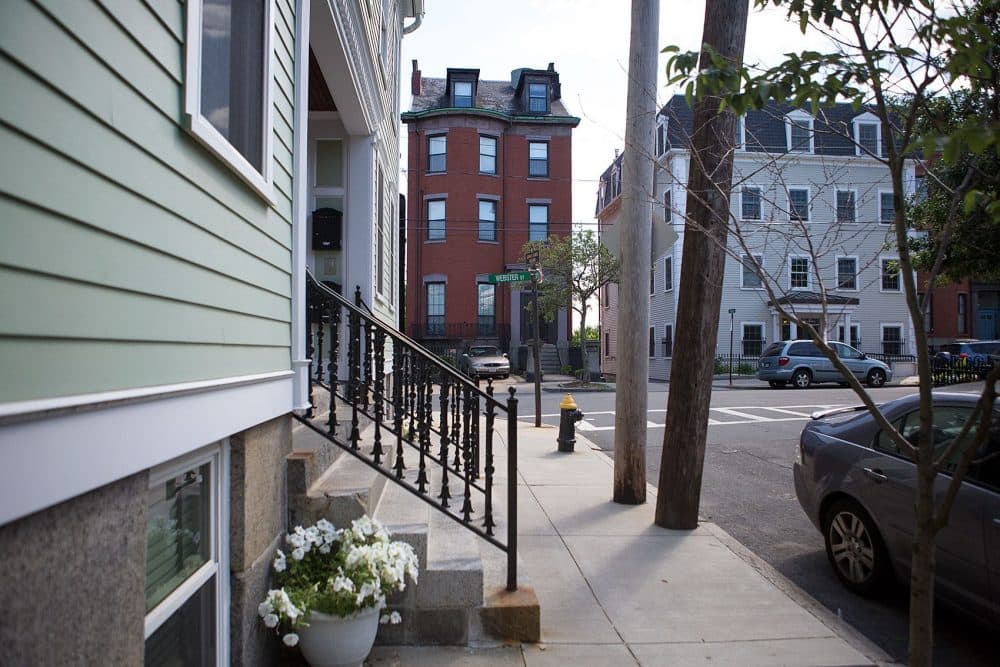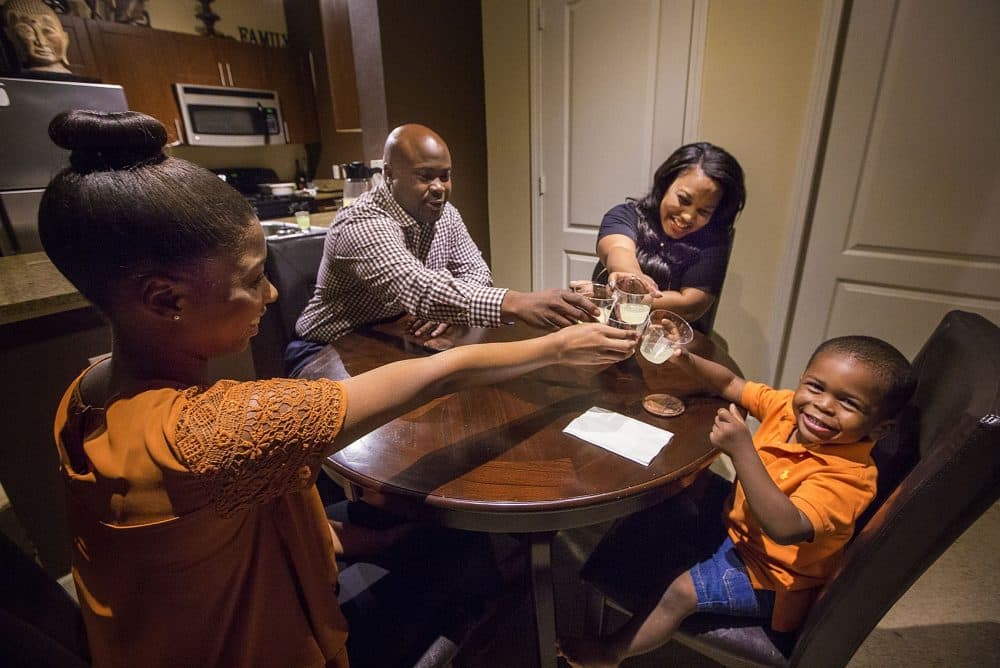Advertisement
How Homeownership Affects Greater Boston's 'Immense' Racial Wealth Gap
Resume
Among the big themes of this year's presidential campaign is the growing gap between America's rich and its poor, which increasingly defines a number of American cities, including the Boston area.
In June, we asked this question about Boston: How is it that a city with one of the country's most robust economies is also the American city with the highest rate of income inequality? In that story, we met J'Neen Skinner-Seney, who had made the transition from welfare to work, and told us about one of the major goals for her family: buying a kitchen table.
"People don't realize what people in my situation don’t have,” Skinner-Seney said, as she struggled to hold back tears. “I go to work with people who make great money and have beautiful homes, and I go home and we sit on the floor. So ... I get very emotional."
After hearing Skinner-Seney’s story, WBUR listeners and readers reached out to her, bought her a kitchen table, and helped her pay some of her bills.

Things have improved in other ways for Skinner-Seney and her husband. They now both have stable jobs with a nonprofit in Boston. And Skinner hopes to start her own nonprofit, which she wants to call The Kitchen Table, to help others transition from welfare to work.
But she says they are still a long way from a key piece of the American Dream. "Currently, we're looking to buy a home, and it is quite a struggle across the board," she said in a recent interview.
It’s a struggle because Boston has some of the highest housing prices in the country, and because when times were tough, Skinner-Seney and her husband relied on credit cards to pay their bills — and fell behind. Skinner-Seney also has more than $30,000 in student loans, so their credit score is too low to qualify for a mortgage.
"We were both not educated on the importance of having a high credit score,” she said. “So now we are diligently working on paying off past-due balances — so it has been very difficult."
Skinner-Seney, who is African-American, and her husband, the son of Haitian immigrants, are still struggling to make it in Boston.
They are part of the story of a city with a dramatic racial disparity in wealth, according Patricia Munoz, an assistant vice president of the Federal Reserve Bank of Boston, and the author of a 2015 report, "The Color of Wealth in Boston."
"When you get deeper into the data, you really realize that the racial differences and ethnic differences are immense — especially in the Boston metro area," Munoz said.
Munoz found a widening wealth gap along racial lines. Among her key findings: White households have a median net worth (the value of their assets minus their debts) of about a quarter of a million dollars. The median net worth of black households: almost zero.
The report also found that black households — like Skinner-Seney's — have much more debt than white households. And almost 80 percent of white families own a home, while just a third of black families do.
Munoz says that means blacks have much less ability than whites to pass wealth on to their children, perpetuating that racial wealth gap.
"It's really the money that's passed down from generation to generation, so whites are more likely to get help to buy a house, more likely to help pay for education,” Munoz said. “So then you see the cumulative consequences reflected in that number."
By contrast, consider the experience of Setti Warren, who inherited his home in the wealthy town of Newton.
"I think about my story and how fortunate I've been because there's no way my wife and I would be able to afford to live in that house right now if not for the inter-generational transfer of our home,” Warren said.
Warren is not just a fortunate homeowner in Newton; he's the mayor, and he's African-American -- and keenly aware of the racial wealth gap and of how few blacks are in his position. Warren’s father was a Korean War vet who bought the family home with the help of the GI Bill.
"This idea that if you work hard, you're able to take care of yourself and your family, and you're able to ensure that your child's life will better off than yours — that story is something that we're losing,” Warren said.
Homeownership is the major way families pass on and build wealth. But in Massachusetts, if you're not white, chances are your family doesn't own a home. Statewide, almost 70 percent of white families own their own homes, while less than a third of black, Latino and Asian families do.
Tom Callahan, the executive director of the Massachusetts Affordable Housing Alliance in Dorchester, says that’s the second-widest homeownership gap in the nation.
“That surprises some people because we feel like we're a progressive state with progressive policies around housing,” Callahan said. “And we are in a lot of ways, but the homeownership gap has been stubbornly large, and in recent years, it has even widened slightly."
The causes of the homeownership gap are many and complicated, including racially discriminatory housing and lending policies of the past.
To address it, Callahan favors federal, state and local policies to build more middle- and low-income housing units, which he says would help close the housing gap -- and that yawning wealth gap, which the Boston Fed calls "a public policy challenge requiring immediate attention."
WBUR is participating in a national week of conversation, along with other NPR member stations, on economic opportunity. Find more from "A Nation Engaged" here.
Correction: An earlier version of this story said Wedly Seney is an immigrant from Haiti. He is the son of Haitian immigrants. We regret the error.
This article was originally published on September 22, 2016.
This segment aired on September 22, 2016.
